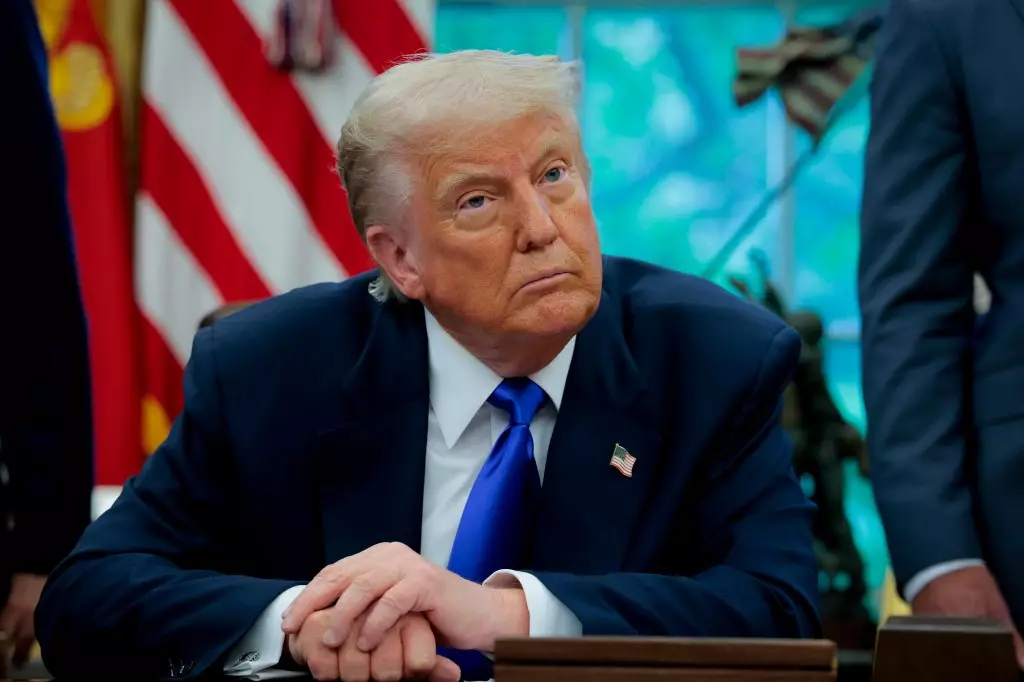As the United States braces for potential economic upheaval, courtesy of President Donald Trump’s aggressive trade policies, it’s impossible to overlook the baffling rhetoric that surrounds him. Recently, late-night comedian John Oliver dissected Trump’s perplexing metaphor about dolls aimed at young girls, which hilariously highlighted the president’s inability to grasp the nuanced reality of childhood. In a world where serious global issues demand thoughtful discourse, such trivial analogies come across as not just misguided but also deeply outdated.
Trump’s comments, initially suggesting that girls may now need to purchase between two to five dolls instead of the exaggerated counts of 30 or 37, underscore a fundamental disconnect. The implication is not merely about the number of toys; it reflects an almost childlike understanding of gender roles and childhood interests. By likening young girls’ playthings to an economic transaction, Trump trivializes the broader impacts of his policies on youth culture. Oliver, cutting through the noise with his signature wit, noted his discomfort with how Trump addresses young girls, drawing attention to the absurdity of the scenario. It raises the question: does the president truly fail to understand what interests modern girls, or is this merely a symptom of a larger pattern of outdated perspectives?
Comedy as a Mirror for Society
John Oliver’s approach in unpacking these troubling metaphors serves more than just comedic relief; it acts as a vital commentary on contemporary society. While Oliver’s satire thrives on the hyperbole of Trump’s doll-counting blunders, each joke peels back layers of a much larger issue: the alarming tendency of public figures, particularly those in power, to reduce complex identities to simplistic narratives. The cavalcade of ages Oliver tossed around, from “45-year-old girl” to “15-year-old girl” illustrates not only a disconnect from reality but also the absurd lengths to which he might go to critique the administration’s nonsensical moments.
Moreover, Oliver’s biting commentary on Trump’s past associations, particularly with notorious figures, serves to remind audiences of the troubling complexities of political narratives. By associating Trump’s rhetoric with broader societal issues, Oliver amplifies the discomfort surrounding the president’s offhand remarks into a larger discussion about accountability and awareness in political leadership.
Pop Culture and Political Commentary
Bringing in additional targets such as Jeanine Pirro, whom Oliver dubbed the “meanest drunk aunt,” illustrates how late-night comedy stitches together the fabric of political analysis and pop culture critique. His jovial yet biting humor provides a platform for probing the political dynamics of not only Trump but the broader GOP landscape. Even as he delves into lighter topics, like the ascension of a Chicagoan to the papacy, Oliver keeps the underlying tensions palpable, leaving viewers oscillating between laughter and reflection.
In the broader landscape of political commentary, Oliver’s ability to blend humor with analysis reaffirms the power of satire as a tool for social change. By shaking up societal norms through laughter, he invites the audience to engage critically with the absurdity of current events, revealing an urgent need for more thoughtful dialogue in political discourse. The doll metaphor, in all its absurdity, becomes a rallying cry for deeper engagement with the real implications of political decisions that extend far beyond the world of toys.

